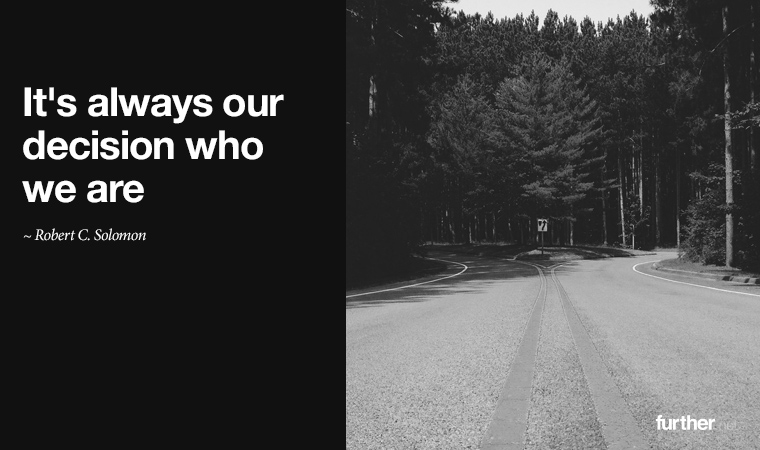
I picked up a copy of Mind Hacking: How to Change Your Mind for Good in 21 Days while wandering through a bookstore. I usually buy Kindle ebooks these days, but there’s something cool about the random discovery of a physical book on a shelf.
Although I was initially leery of the “Hack” metaphor, at least the author had real hacker experience as an early computer enthusiast. The process set forth in the book breaks down into three distinct parts — analyzing the mind; imagining making the mind do things differently, and then reprogramming to break bad habits and create new, beneficial ones.
I’ve only made it into the analyzing section so far, but I was immediately struck by how the author cleverly repositioned something we already know about. He uses an analogy of film to explain how there’s your mind, and then there’s “you” — the observer of the contents of the mind.
- Your mind is like a movie. Just as in the movie theater there is “you” watching a “movie,” in your own head there is a “you” watching your “mind.” And like a great piece of cinema, you are absorbed in the movie in your mind: the thoughts, emotions, memories served up in a constant stream.
Some of you may recognize this as similar to Plato’s Allegory of the Cave, where the inhabitants mistake the fire’s flickering shadow against the wall as “reality,” when reality is actually outside of the cave. Likewise, we mistake the movie playing inside our head as “real,” when it’s nothing of the sort.
You are not the contents of your mind, nor is your “self” anything more than a flow of intangible and fleeting thoughts and memories that have conditioned you into believing the movie is real. So when Hargrave recommends analyzing the mind, what’s he really talking about?
And while mindfulness meditation improves your general well-being, reduces depression, anxiety and stress, increases productivity, improves self control, and even changes the composition of your brain for the better, the original purpose of the practice is to observe the intangible nature of the ego in order to alleviate the suffering that comes from taking your “self” too seriously.
Once you realize that your sense of self is an illusion, you can more effectively make changes. In Hargrave’s terms, it’s time to imagine a cool new you, and start reprogramming.
Hey, if thinking is terms of “hacks” is what does it for you, you’ll get no argument from me. Go with scientific language such as “meta-cognition” and “psychological distance,” rather than traditional spiritual notions of “consciousness” and “enlightenment.”
They’re all just concepts made up by human minds anyway. 🙂
Mind Hacking: How to Change Your Mind for Good in 21 Days
Keep going-
Brian Clark
Further
further: health
Fitness for Life
Exercise has a Goldilocks problem, with experts debating just how much exercise is too little, too much, or just the right amount to improve health and longevity. Two new, impressively large-scale studies provide some clarity.
The Right Dose of Exercise for a Longer Life
Highly Caffeinated
A can of Red Bull has 80 milligrams of caffeine. One small cup of Starbucks drip coffee has more than three times that amount.
Here’s the Maximum Amount of Caffeine You Should Drink in a Day
Semper Fit
The military diet is currently one of the world’s most popular “diets.” It is claimed to help you lose weight quickly, up to 10 pounds (4.5 kg) in a single week. The military diet is also free. There is no book, expensive food, or supplement you need to buy.
The 3-Day Military Diet – A Beginner’s Guide
further: wealth
Collaborate to Great
It doesn’t matter how smart or savvy we are when it comes to technology, product development, or any single skill we possess. Nobody succeeds for long in a silo.
Four Reasons Why The Most Successful People Are Great Collaborators
Phoning It In
Our smartphones are transforming into personal assistants. Soon, mobile productivity won’t just be about getting notifications, setting reminders, or scheduling meetings on the go.
Three Ways Google Predicts Your Smartphone Will Change The Future Of Work
Hand Jive
Writing by hand strengthens memory in comparison to writing on a real or virtual keyboard, new research finds. The motor feedback from the process of writing along with the sense of touching paper and pen helps people learn.
Handwriting Has a Psychological Advantage Compared With Using Real or Virtual Keyboards
further: wisdom
Thank You for Being a Friend
A number of studies have shown that friends are vital to our physical health and emotional well-being. But to have great friends, you need to be a great friend.
How To Be A Better Friend, Even When You’re Busy
All That Jazz
According to Dr. William Klemm of Psychology Today, there are a multitude of different cognitive benefits that enrich your mind while listening to jazz music.
People Who Listen To Jazz Are Smarter And More Creative
It’s Been Emotional
Scientists just got one step closer to understanding the nuts and bolts of how your mind handles emotions. An MIT team has identified two neural connections in the brain’s amygdala regions that process positive and negative emotional events.
Scientists Identify Neurons That Help You Process Emotions
further: sharing
Thank you for sharing Further with anyone who might enjoy it!
